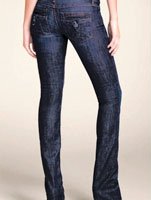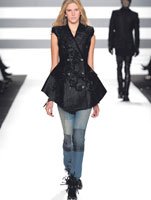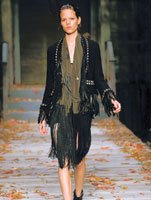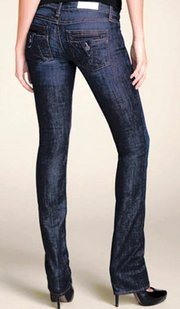People's Liberation Looking for Investors With Court Battle Looming
Following the loss of millions of dollars in potential business, People’s Liberation has turned to a tried-and-true Los Angeles private investment banking firm to find someone to give the apparel company an injection of capital or come up with a new investor.
According to sources close to People’s Liberation, The Sage Group, which has helped dozens of Los Angeles apparel companies sell their ventures for lucrative sums, has stepped in to round up investors in the Los Angeles denim maker, which is mired in a costly lawsuit with San Diego–based retail chain Charlotte Russe. Last year, Charlotte Russe, under new ownership, broke its three-year, $65 million contract to exclusively distribute the People’s Liberation label at its nearly 500 stores.
The court case, which was filed in October, puts People’s Liberation in a bind because it is unable to sell its People’s Liberation brand of denim and casual clothing to other retail outlets while it wages a court battle over the legality of Charlotte Russe dropping the label from its lineup and ending its contract. Both companies have been filing documents with the court, but a trial date has not been set in the case.
Meanwhile, People’s Liberation, which did not return calls for comment, is depending on its other two brands, William Rast and J. Lindeberg, to maintain its financial health. Despite the loss in sales from Charlotte Russe stores, first-quarter net revenues this year at People’s Liberation inched up slightly to $8.3 million, with a $979,930 net loss, compared with $7.5 million in net revenues and a $1.4 million net loss during the same period last year. Deal or no deal
People’s Liberation’s legal battle dates back to 2008, when Charlotte Russe approached the premium-denim brand about exclusively carrying the People’s Liberation brand, court documents state. A three-year contract was drawn up and signed on Dec. 16, 2008, court papers show. By April 30, 2009, People’s Liberation had stopped shipping to its traditional doors in North America and Central America and began exclusively supplying Charlotte Russe, a mall-based retailer whose clients range from teen-agers to people in their early 20s.
In the contract, People’s Liberation agreed that Marcella Lindeberg, its creative director who has since moved to New York, would design a collection that was more moderately priced than its previous line in order to appeal to Charlotte Russe’s young customers.
Blue jeans would retail for $88 to $98, knit tops would go for $30 to $35 and graphic T-shirts would fetch $18 to $25. During the first year of the contract, Charlotte Russe was committed to buy $15 million in merchandise. During the second and third year of the contract, the retailer would be obligated to purchase $25 million each year. If the company opted for a fourth year, the merchandise buy would be $30 million
Between July and October, 2009, according to court documents, People’s Liberation shipped $6 million in goods to Charlotte Russe, which were paid for by the retailer.
Meantime, while all this new merchandise was arriving, Charlotte Russe, then a publicly traded company, hired Cowen & Co. to look for a buyer after a hostile-takeover bid by investment company Karp & Reilly.
A search was successful, and on Oct. 14, 2009, Advent International Corp., a $24 billion investment group in San Francisco, acquired Charlotte Russe for $380 million. Soon after, Advent International informed People’s Liberation it was not interested in third-party merchandise and wanted to terminate the contract, court papers note.
On Oct. 23, People’s Liberation received a formal termination letter, saying that Charlotte Russe was “fraudulently induced” to enter into the contract. On Oct. 26, Charlotte Russe filed a lawsuit in Los Angeles County Superior Court against People’s Liberation for fraud and breach of contract. The following day, People’s Liberation filed a lawsuit against Charlotte Russe for breach of contract and fraudulent misrepresentation. People’s Liberation is seeking $59 million in compensatory damages as well as punitive damages.
Amidst all this legal turmoil, People’s Liberation hired The Sage Group to look for strategic alternatives. In the genes
People’s Liberation was founded in July 2004 by Danny Guez, scion of Los Angeles blue-jeans godfather Paul Guez, known for the meteoric rise and fall of his Sasson Jeans in the 1980s. Danny Guez bowed out of the publicly traded company in the fall of 2007, following the arrival of Colin Dyne as the new chief executive and chairman of the board. Danny Guez sold his shares to Gerard Guez, his uncle and head of Tarrant Apparel, who, as of the end of last year, owned 30 percent of the company’s stock. Dyne owned 21 percent.
Guez’s legacy during his three-year stay at the company was to partner up in 2005 with singer/actor Justin Timberlake and Timberlake’s childhood friend Trace Ayala to create William Rast. The brand of men’s and women’s contemporary apparel was the most lucrative portion of the company’s $35.6 million in sales last year.
When Dyne, who came from zipper company Talon International, joined the group, he saw that People’s Liberation was the weaker of the brands even though the premium contemporary label was selling at high-end stores such as Nordstrom, Bloomingdale’s and Neiman Marcus.
The Sage Group, which did not return calls, was instrumental recently in finding an investor in J Brand, the Los Angeles premium-denim company founded in 2005 by Jeff Rudes and Susie Crippen. In February, Star Avenue Capital in Los Angeles bought a majority share of the blue-jeans brand for $85 million. The Sage Group also helped to sell Los Angeles–based Juicy Couture in 2003 to industry giant Liz Claiborne Inc.

























